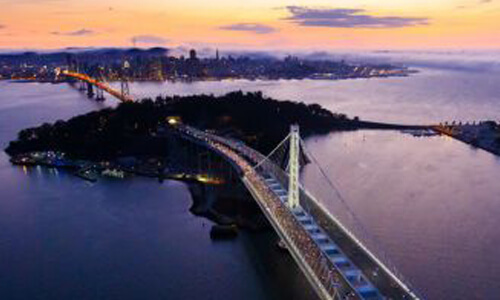Dear FO° Reader,
Some of you might have read my Sunday email. Here, I will develop on the themes I explored in that email. I am in the San Francisco Bay Area, a stunning part of the world.
I have stayed in a house of entrepreneurs, meeting some very bright minds. They are planning to move to another house and have been interviewing others. These young entrepreneurs have an emotional maturity, focus and work ethic that I lacked at their age.
At its best, this part of the world is full of entrepreneurs, engineers, scientists and all sorts of exciting people. There is certainly a buzz in the air. For instance, I rode in a driverless car for the first time. The autonomous vehicle picked me up in three minutes and drove me home. If I had not come to San Francisco, I would have never had the opportunity to ride in a driverless electric car.

Engel Ching / shutterstock.com
Innovative City
Even as these fancy driverless cars, Uber and Lyft work well, public transportation leaves a lot to be desired. To be fair, the trains of the Bay Area Rapid Transit (BART) system are newer and getting around the city seems a bit easier than when I taught at the University of California, Berkeley. Yet it is a pain to get from Glen Park to Mountain View. The change at Millbrae from the BART system to the Caltrain takes a while and, even when you get to posh Palo Alto, you may struggle to find a bus that takes you to your destination.
As pointed out earlier, San Francisco still remains a city of extraordinary innovation with brilliant minds. The city and surrounding area are home to the likes of Apple, Facebook (now known as Meta), Google (now Alphabet), Uber, Cisco, Airbnb, Pixar Animation Studios, Tesla and even Wikipedia. In per capita terms, this is the richest city in the US. It is also a stunning city with steep hills and breathtaking views. In more ways than one, this is now the economic and technological innovation powerhouse of the world.
Dystopian Possibilities
Yet San Francisco and even Berkeley also feel like real-life Gotham City where the homeless sometimes defecate on the streets. Both cities reflect the growing inequality and poverty in the US. Some people are simply not doing too well. Policemen, teachers and nurses drive from as far as Truckee, nearly 200 miles away, to do their jobs in a city where rent has spiraled out of control.

David Tran Photo / shutterstock.com
With ChatGPT unleashing a new era, it seems that paralegals, accountants and other white collar jobs might go the way of so many workers. Where will the new jobs come from in the age of artificial intelligence (AI)? What happens to the likes of me who study literature, history and philosophy? Will humanities students become chefs, yoga instructors and babysitters?
Many economists argue that technology creates more jobs than it destroys. The Industrial Revolution created the most prosperity the world has ever experienced. Increased productivity is a jolly good thing.
Yet we could do well to remember that this time in history was marked by increased slums, grueling poverty and much misery. A quick read of Charles Dickens tells us that not all was well in Merrie England where the mills spun looms for the world.
It is issues like these that we discussed in our first FO° Meetup in the San Francisco Bay Area on Friday, August 18. Chief Financial Officer Ti Ngo organized the meetup in a fantastic local brewery run by a very interesting Vietnamese American. Longtime supporter and author Steven Elleman, PhD student Andrew Collins and experienced investor Sanjay Misra were among the small group that congregated. During the course of the evening, Sanjay remarked: “The world has always been unfair. The world will always be unfair. However, the big question is whether we can make it a little better tomorrow.”
This is precisely what Fair Observer is endeavoring to do. That is why we meet, discuss, think, publish and do much more. At a time of filter bubbles and echo chambers, we inform and educate through many perspectives from around the world so that things might be a little better tomorrow.
My warmest regards,
Atul Singh
Editor-in-Chief
P.S. Note that we have three important announcements.
- FO° Exclusive: For the first time in three years, we are taking a break. Glenn Carle, our retired CIA expert and I, the editor-in-chief, are traveling. On a related note, many of you have been very curious about Glenn, and you can watch his very candid three-part interview with Atul—Part 1, Part 2 and Part 3—in “Meet the Spy” on our YouTube channel.
- FO° Meetup: We meet in New York City at 6:00 PM, Eastern Time, on Thursday, 31 August at Starbucks Reserve, Ste 105, Empire State Building, 350 5th Ave, New York, NY 10118 (note that we will be meeting in the Concourse Level at the Starbucks. So come downstairs after entering the coffee shop).
- FO° Meetup: We meet for the second time in Geneva at 6:30 PM, Central European Time, on Thursday, 31 August at La Petite Reine, rue Montbrillant, behind the train station, Cornavin. You can get here using public transportation easily and find parking lots nearby too.

We are an independent nonprofit organization. We do not have a paywall or ads. We believe news must be free for everyone from Detroit to Dakar. Yet servers, images, newsletters, web developers and editors cost money. So, please become a recurring donor to keep Fair Observer free, fair and independent.
|
















